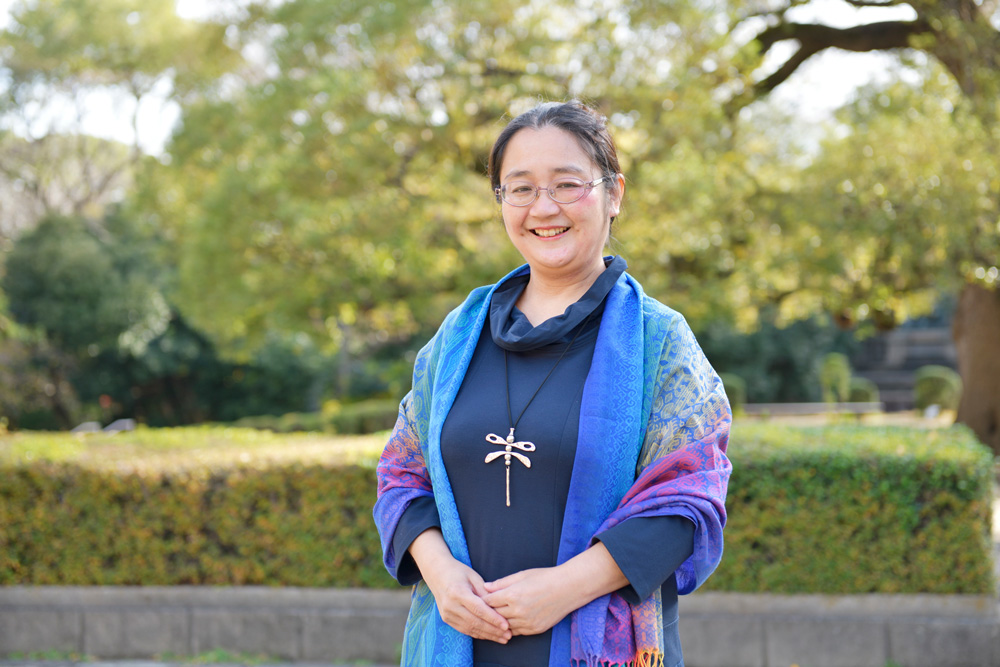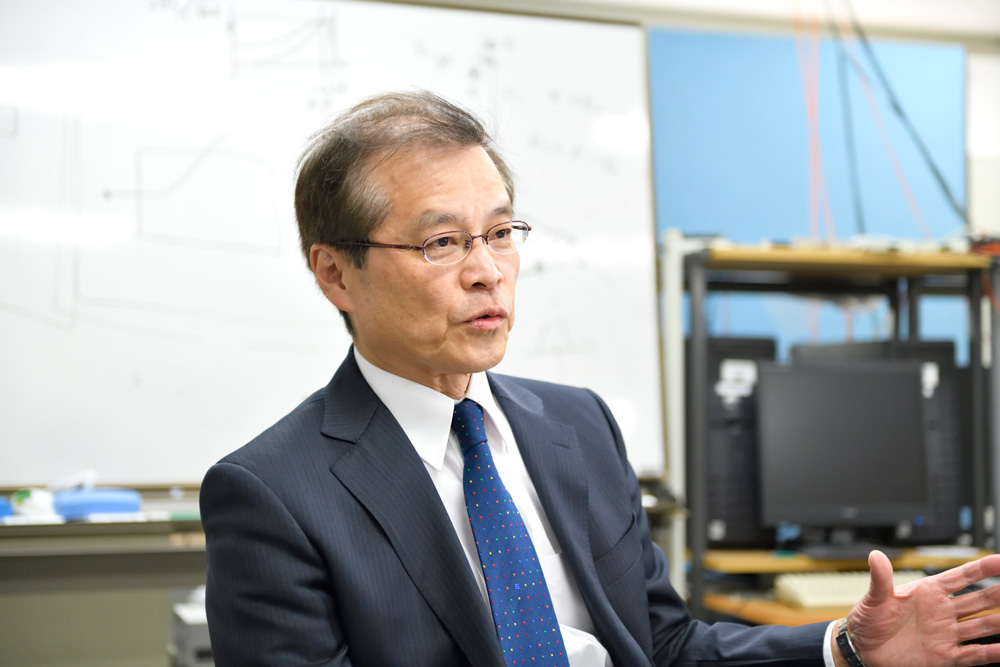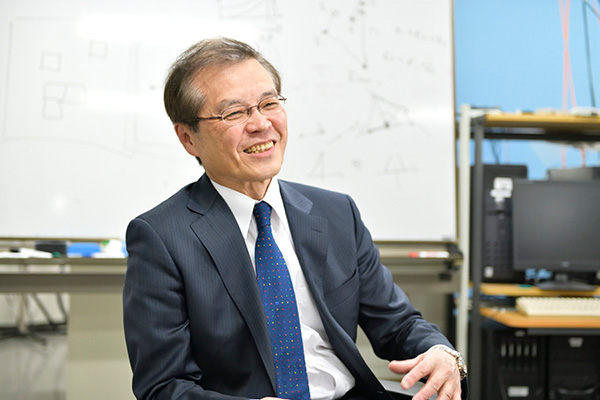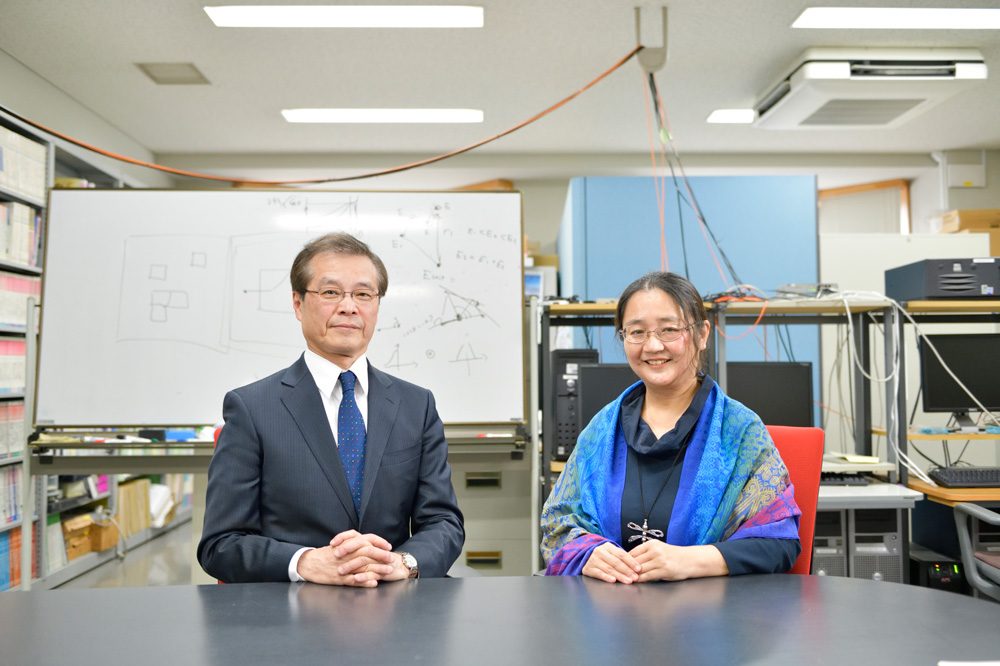Transforming Science with Open Data
Amid the advent of the big data era, data is becoming a valuable commodity which can be used to innovate just about everything, from businesses to our lifestyles.The public has access to all kinds of data these days including the research data that academic institutions had formerly kept for their own uses. Further propelling this trend is the idea that citizens have the right to access research data since many research projects are funded by taxpayers’ money. The “public access” concept first became prevalent in big sciences, such as in astronomy and particle physics, before spreading to other disciplines. The University of Tokyo, for one, is known for its development of the Data-dirven Society Platform, a mechanism intended to promote a data-proficient society. We recently visited Dr. Hiroaki Aihara, vice president of the University of Tokyo, who leads the project with Prof. Miho Funamori of the Research Center for Open Science and Data Platform at the National Institute of Informatics.

Ask an Expert: Prof. Hiroaki Aihara (University of Tokyo)
Prof. Aihara is the Executive Director and Vice President of the University of Tokyo. A professor for the university’s School of Science, Prof. Aihara is known for his research on particle physics through the use of high-energy accelerators in his experiments. His achievements include making significant contributions to the 1995 discovery of the top quark, and the 2001 discovery of particle-antiparticle asymmetry in the B meson system. Prof. Aihara received his bachelor of science and doctorate degree in physics in 1978 and 1984, respectively, both from the University of Tokyo. He became an associate professor at the university in 1995 and has served as a professor since 2003.

Ask an Expert: Assoc. Prof. Miho Funamori (the National Institute of Informatics, NII)
Assoc. Prof. Funamori works for the NII’s Information and Society Research Division. Since 2017, she has also served as a strategy manager at the NII’s Research Center for Open Science and Data Platform (RCOS) and has written extensively on “miho channel”, a blog about overseas’ higher education trends on the center’s website. Prof. Funamori spent her middle school years in Germany. She received her bachelor of science and master’s degree in Earth physics in 1991 and 1993, respectively, both from the University of Tokyo. She joined the NII in 2016, following her careers at the Ministry of Education, Culture, Sports, Science and Technology (MEXT), the National Graduate Institute of Policy Studies, and the University of Tokyo.
Open science as a necessary path to the future

Prof. Miho Funamori of the NII’s Research Center for Open Science and Data Platform (RCOS) believes the open science movement was destined to happen in a maturing society.
“Universities, which were once ‘ivory towers,’ have gradually opened themselves up to society at large. Open science occurred in this context,” Prof. Funamori said.
“Martin Trow, an American sociologist and a global authority on higher education studies, predicted back in 1973 that universities would transition from being the institutions for only the elites to those for the mass population, and then on to become ‘universal’ entities,” said Prof. Funamori, who specializes in higher education and university management. “Higher education becomes popularized once the higher education attainment rate exceeds a certain level . This has happened in Japan, too, where more than 50 percent of high school graduates enroll in college today.”
The popularization of higher education has also changed how scientists look at their research work in relation to society, according to Prof. Funamori. The World Conference on Science in 1999 was the watershed moment in this shift, she pointed out.
“Newly emerged at this conference was the idea that knowledge belongs not only to so-called experts but also to all members of society at large. This ushered in a new epoch,” Prof. Funamori said. This change, together with various other factors, created a fertile environment for the open science trend to grow, she said.
“Much of research funding comes from taxpayers. So, we need to be accountable for the funding received and use it in a way that is beneficial to society.”
The infrastructure for open science is also growing every day, thanks to the prevalence of the internet and the growing availability of digital data. Advancements in open data technologies, as well as societal changes, have accelerated the open science trend, and we are all living in it, Prof. Funamori said.
Technological sophistication as a key to open science

The difficulty in opening research data, though, is that it’s highly technical and requires specialized knowledge to understand it. This is why data from astronomical observations, for example, is made open along with an analysis software only after the data is formatted for general usage. The University of Tokyo has been offering courses on how to use the open data it provides through summer school and similar type of programs.
“Opening data isn’t as simple as it may sound,” said Dr. Hiroaki Aihara, the vice president of the University of Tokyo, who specializes in particle physics research. “To make open data truly usable and valuable to all, various kinds of supportive technologies have to become more sophisticated. Only then can society as a whole enjoy the benefits of open data,” Dr. Aihara said.
These supportive technologies include applications for high-speed data processing, data protection and private data protection, among others.
Supportive technologies are necessary because there are many different issues involved in exchanging data, including properly crediting the source of data. Dr. Aihara pointed out that people used to think data belonged to the individual researchers who actually discovered it. Data would typically be kept under a veil until the researcher released their research paper.
“In particle physics, you need to analyze an astronomical amount of data. To work around this issue, we used to conduct research as a group,” Dr. Aihara said. “Some would say it shouldn’t matter who originally found particular data, if someone was able to advance science by using the data. But it’s important to recognize all the people whose work contributed to the new finding, and we are trying to develop an open data system that enables us to do just that.”
Open data can be used for many different purposes, such as the modeling of scientific mechanisms and simulations through the use of artificial intelligence and machine learning.
“The volume of data matters. When there’s a massive amount of accessible data, it changes the value of data, because it enables different dots to become connected, resulting in new discoveries,” Dr. Aihara said. “So ‘big data’ that people talk about these days have the power to fundamentally transform the way we do research. It exponentially expands the possibility of what we can do with data,” he said. “That’s what you call a digital revolution.”
Bringing together big data to connect dots

Dr. Aihara envisions a Data-driven Society Platform that would bring together all sorts of data in one place and make it available to the public in user-friendly formats, including an app. The key, he said, is to have a technologically solid framework that enables users to effectively link data.
“For example, the University of Tokyo has three-dimensional geospatial data of Japan, and the data can be linked with other types of data, such as mobility data,” he said. “If a doctor wants to prevent an infectious disease from spreading, they would need not only the patient’s clinical data but also the geographic and transportation data that can help them track the person’s whereabouts. By combining these different kinds of data, they could figure out how to help prevent other people from getting infected,” he said. “We want the users of the platform to be able to easily navigate the database and combine data in the way I just talked about. Geographical movements of people are a direct indicator of economic activities. So, it can be used for many other purposes, including disaster response and prevention.”
Work is also underway to make available big data on water, climate, and various kinds of real-time data on the Data-driven Society Platform. In addition, the university is developing a system that automatically shows various types of data that may be useful for a particular project when users enter a description of their project.
“We are also considering a system that presents easy-to-understand descriptions of technical data for non-experts by taking advantage of metadata to sort data,” Dr. Aihara said. “When a user tells the system his/her purpose, the machine looks up all the data on it and suggests different options for data combinations. At least, that’s how we envision it right now.”
Expert dialogue: Opening data the right way

Funamori: Allianz der Wissenschaftlicheorganisationen, which is an association which membership includes all the top academic institutions in Germany, has published a position paper titled, “Research data at your fingertips.” It says today’s academic institutions ought to provide a research environment where a newly assigned faculty member could access all available data from day one, easily manage their own data, and make the data openly available whenever they want. Talented researchers tend to flock to institutions like that, helping them become top-notch institutions, according to the publication. I thought no academic institution was practicing the recommendation, and then realized the University of Tokyo was doing just that!
Aihara: Well, we aren’t doing it just to help ourselves but for the benefit of the entire country. In fact, we will be working closely with other universities and research institutions to design the details of the specifications. Making society a better place is the reason why we gather data and open it for public use in the first place. Scientists believe something good will come of it. But it’s also important to work with researchers in the humanities fields to make sure the system is useful for all.
Funamori: I attended the National Institute of Science and Technology Policy (NISTEP)’s symposium the other day. They were discussing which research field will have advanced the most in 10 years. They predict that will be IT technology. In addition, some argued for the importance of legislation addressing the needs of the digital era, including privacy protection. This implies the fundamental importance of IT technology in this era.”
Aihara: For a digital revolution to benefit society as a whole, we need people from diverse sectors – ranging from business professionals to public policymakers – to participate in the development of an open research data system. Otherwise, the system won’t be able to support research activities, and science won’t advance. Open data is a way to get the biggest bang out of tax money invested in research. That’s the crux of open data and open science.

Interviewer: Rue Ikeya
Photographs: Toshiyuki Kono (article); Yuji Iijima (column)
Released on: Feb. 10, 2021 (The Japanese version released on Feb. 10, 2020)





